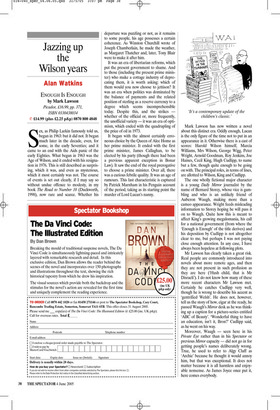Jazzing up the Wilson years
Alan Watkins
ENOUGH IS ENOUGH by Mark Lawson Picador, £16.99, pp. 371, ISBN 0330438034 ✆ £14.99 (plus £2.25 p&p) 0870 800 4848 Sex, as Philip Larkin famously told us, began in 1963: but it did not. It began much later in the decade, even, for some, in the early Seventies; and it came to an end with the Aids panic of the early Eighties. What began in 1963 was the Age of Wilson, and it ended with his resignation in 1976. This is still described as surprising, which it was, and even as mysterious, which it most certainly was not. The course of events is set out clearly, if I may say so without undue offence to modesty, in my book The Road to Number 10 (Duckworth, 1998), now rare and scarce. Whether his departure was puzzling or not, as it remains to some people, his age possesses a certain coherence. As Winston Churchill wrote of Joseph Chamberlain, he made the weather, as Margaret Thatcher and, later, Tony Blair were to make it after him.
It was an era of libertarian reforms, which put the present government to shame. And to those (including the present prime minister) who make a cottage industry of deprecating them, it is worth asking: which of them would you now choose to jettison? It was an era when politics was dominated by the balance of payments and the related position of sterling as a reserve currency to a degree which seems incomprehensible today. Despite this, and the strikes whether of the official or, more frequently, the unofficial variety — it was an era of optimism, which ended with the quadrupling of the price of oil in 1973.
It began with the almost certainly erroneous choice by the Queen of Alec Home as her prime minister. It ended with the first prime minister, James Callaghan, to be elected by his party (though there had been a previous apparent exception in Bonar Law). It saw the end of the royal prerogative to choose a prime minister. Over all, there was a curious febrile quality. It was an age of rumours. This last characteristic is captured by Patrick Marnham in his Penguin account of the period, taking as its starting point the murder of Lord Lucan’s nanny. Mark Lawson has now written a novel about this distinct era. Oddly enough, Lucan is the only figure of the time not to put in an appearance in it. Otherwise there is a cast of scores: Harold Wilson himself, Marcia Williams, Mrs Wilson, George Wigg, Peter Wright, Arnold Goodman, Roy Jenkins, Joe Haines, Cecil King, Hugh Cudlipp, to name but a few, though quite enough to be going on with. The principal roles, in terms of lines, are allotted to Wilson, King and Cudlipp.
The one wholly fictional major character is a young Daily Mirror journalist by the name of Bernard Storey, whose vice is gambling and who is an unlikely friend of Auberon Waugh, making more than a cameo appearance. Wright feeds misleading information to Storey hoping he will pass it on to Waugh. Quite how this is meant to affect King’s growing megalomania, his call for a national government (from where the ‘Enough is Enough’ of the title derives) and his deposition by Cudlipp is not altogether clear to me, but perhaps I was not paying close enough attention. In any case, I have always been hopeless at following plots.
Mr Lawson has clearly taken a great risk. Real people are commonly introduced into novels about more remote ages, and then they are not present in such profusion as they are here (‘Hush child, that is Mr Disraeli’). I do not know how many of these more recent characters Mr Lawson met. Certainly he catches Cudlipp very well, though he is wrong to describe his accent as ‘gentrified Welsh’. He does not, however, tell us the story of how, cigar at the ready, he passed Waugh’s Mirror desk as he was thinking up a caption for a picture-series entitled ‘ABC of Beauty’. ‘Wonderful thing to have an education, isn’t it, Bron?’ Cudlipp said, as he went on his way.
Moreover, Waugh — seen here in his Private Eye rather than in his Spectator or previous Mirror capacity — did not go in for getting people’s names deliberately wrong. True, he used to refer to Algy Cluff as ‘Archie’ because he thought it would annoy him, but that was exceptional. It does not matter because it is all harmless and enjoyable nonsense. As James Joyce once put it, here comes everybody.


















































 Previous page
Previous page